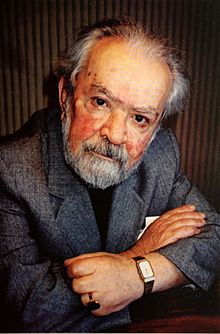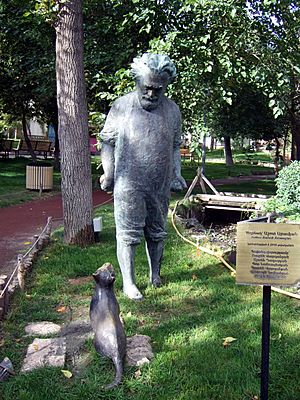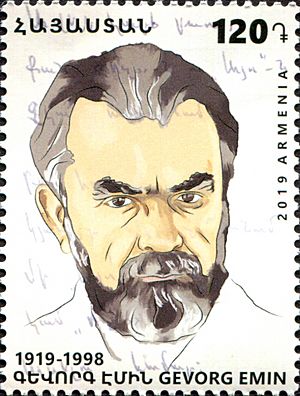Gevorg Emin facts for kids
Quick facts for kids
Gevorg Emin
Գևորգ Էմին |
|
|---|---|

Gevorg Emin
|
|
| Born | September 30, 1919 Ashtarak, First Republic of Armenia |
| Died | June 11, 1998 (aged 78) Yerevan, Armenia |
| Occupation |
|
| Nationality | Armenian |
| Literary movement | Socialist realism |
| Notable works | Seven Songs About Armenia |
| Relatives | Artashes Emin (son), Vazgen Muradian (brother), Vago Muradian (nephew) |
| Signature | |
 |
|
Gevorg Emin (Armenian: Գևորգ Էմին, born September 30, 1919 – died June 11, 1998) was an important Armenian poet, essayist, and translator. He is known for his clear and strong writing style.
Contents
Early Life and Education
Gevorg Emin was born in 1919 in the town of Ashtarak, Armenia. His father was a school teacher. In 1927, his family moved to Yerevan, which is the capital city of Armenia.
Emin finished secondary school in 1936. Later, in 1940, he graduated from the local Polytechnical Institute. He studied to become a hydraulic engineer. After finishing his studies, he helped design and build a hydroelectric power station. This station still produces electricity today! Even though he was a talented engineer, this power station was his only engineering project.
Becoming a Poet
Emin met a famous Armenian poet named Yeghishe Charents when he was in school. Charents sadly died in 1937 during a difficult time in the Soviet Union. Emin later said that two things made him want to write poetry instead of building power plants. One was meeting Charents. The other was working at the Matenadaran library as a student. There, he could read and hold amazing old books from the 5th to the 18th centuries.
Emin's poetry was deeply connected to the culture and beautiful landscapes of Armenia. He also read a lot of modern poetry, especially from French poets. He strongly believed in the power of words. From 1941 to 1945, Emin fought in World War II and was injured. While his poems don't talk much about his own war experiences, they often mention the Armenian genocide.
Emin's Unique Style
Gevorg Emin's poems have been translated from Armenian into many languages around the world. A famous Russian poet, Yevgeny Yevtushenko, read Emin's work and praised it highly. Yevtushenko wrote the introduction for a collection of Emin's poems translated into English. He noted that Emin's style was different from other Armenian poets who focused more on feelings.
Yevtushenko said that Gevorg Emin liked to show the clear structure of his poems. He compared Emin's poems to "transparent watches" where you can see how all the parts work together perfectly. This clear and direct style might have come from his engineering background.
Another writer, Edmond Y. Azadian, suggested that Emin helped Armenian poetry become more free. He said Emin brought new life to poetry after a long period when new ideas were not encouraged. Martin Robbins also noted that Emin's poems showed "the tough compression of an engineer's mathematically trained mind."
Themes and Recognition
Many of Emin's poems use Mount Ararat as a symbol. This mountain represents the strength and endurance of the Armenian people. In his poem "Song of Songs," he wrote: "I am an Armenian. ancient as this Biblical Ararat / my feet still wet from the waters of the flood."
For his amazing poetry, Emin received important awards. He was given the State Stalin Prize in 1951 and the USSR State Prize in 1976. In 1972, he traveled around the United States with Yevtushenko, giving poetry readings. His experiences in America inspired some of his later poems. These include Gravestone in a Negro Cemetery, First Night in New York, and In the Streets of Boston.
Family and Other Works
Gevorg Emin's first wife was the daughter of another respected Armenian poet, Vahan Terian. After she passed away, he married a writer named Armenouhi Hamparian. Emin had three sons.
Emin was also a well-known translator in Eastern Europe. He was especially admired for translating the works of Polish poets. These included famous writers like Adam Mickiewicz and Tadeusz Różewicz. He felt a connection to Poland's long fight for independence, seeing similarities with Armenia's own history. He admired the "proud spirit of the Polish people" and their strong love for their land, language, and traditions. His brother, Vazgen Muradian, was an Armenian-American composer.
 | Georgia Louise Harris Brown |
 | Julian Abele |
 | Norma Merrick Sklarek |
 | William Sidney Pittman |



